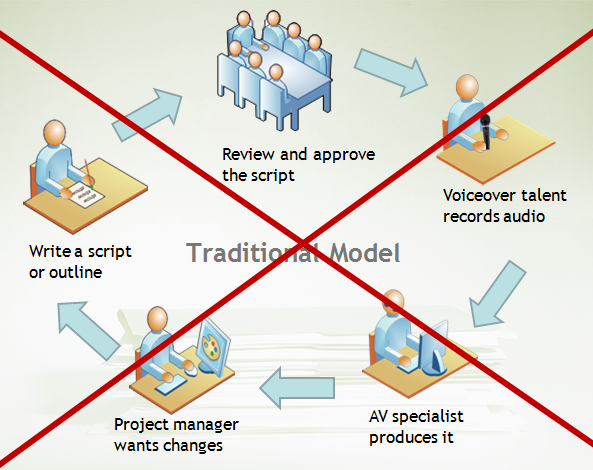The Perfect Voice -- Professional or Authentic?
One trend I think we'll see more and more is the decrease of professional voiceover actors in screencasts when those voiceover actors are merely reading a script they don't understand.
As an example, watch some of the tutorials at lynda.com. The narrators may not be professional voiceover actors, but they are subject matter experts. You can tell they're not just saying words they don't understand. They're narrating and showing intricate parts of the screen at the same time. They're describing processes and tips with the right articulation and inflection that shows they understand the software. I'm willing to bet most users would trade a professional voice for an authentic voice.
It's somewhat of a hard model to break free from. At my work, the norm is to have voiceover talent read a script, while an audiovisual producer creates the screencast. They must have a heck of a time matching the two up, because actually the audiovisual producer doesn't write the script. The project manager usually writes a script, which is then cleaned up by a screenwriter who is not a subject matter expert in what he or she is editing.
As a result, you end up with a voiceover actor, an audiovisual producer, a product manager, and a screenwriter all working together. Sometimes you may end up with a motion graphics person and a graphic designer as well. That whole model is outdated, in my opinion. It's cumbersome, heavy, and expensive. There are too many parts played by too many people. To expect a perfect synchronization is too much.

Despite my feelings against the traditional model, I'm sometimes a willing participant. This week I played a silent role as a facilities manager in some still shots and video b-roll (background motion). The product manager wrote the script. He passed it on to a script writer who modified the script. They had a professional voiceover actor read the script.
With the recorded script, a techie played another user role to act out the motions in a way that matched the voiceover's script. We had a photographer and his assistant come to take still shots of several users doing different actions with the product. The next day two videographers came and did the same but with action clips. There's a motion graphics person who will fit all of this together, and probably another audiovisual producer. There was another person whose job was to coordinate all of this.
When we initially brainstormed the videos, we had in mind a This Old House narrator, or a Bob-Vila type of narrator -- in other words, an expert who would explain the process of setting up Internet access and firewalls in a conversational, natural voice. I expressed my concern that a hired actor would struggle with this, but no, they said, actors do need a script but will do it naturally.
Once we got into the project, it was clear that the actor just read the script. He read it well, but it wasn't transparently authentic, because when he explained where to plug in the cables, he read it too fast -- the actor trying to match his words had to move his hand rather quickly. To expect the narrator to actually go through the motions too was perhaps too much.
Now that all the footage has been captured, I wonder if it will look real -- the narrator reading words he doesn't understand, with a montage of still shots and a couple of silent video clips. It will look professional, no doubt. But is it what users want?
My colleague Paul showed me a screencast he helped create this week. In the screencast, a professional actor against a green screen narrated a script about a new website. She explained various features of the new website, all the while moving her hands in the same expressive motion. Someone skilled in motion graphics put the website as the backdrop behind the narrator, panning around and making the graphics move a bit. My colleague Paul helped work on the script, along with the product manager. This video took months to produce.
In the end, it was about 3.5 minutes long, but it lacked all human appeal. The narrator (a hired actor) was too stiff and professional. It was clear she wasn't an expert on the site. I had no connection with her or the video and just wanted it to end.
In an era of reality shows, transparency, amateurism, and authenticity, the model of the professional actor and the myriad of roles coming together to produce a short screencast is ending. We accept the amateur's voice, as long as the content is relevant, accurate, and clear. We prefer real people who know what they're saying over hollow voices and false inflections.



